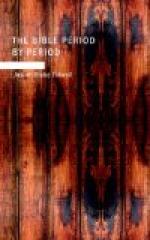For a while they probably held the power of life and
death over their own people, but the capital cases
were punished later by authority of Babylon (Jer.
29:22.) (4)
Their religion. Here also the
information is meager and must be gathered from statements
and inferences found in several books. Several
things are certain: (a) For the most part they
preserved their genealogies, thus making possible the
identity of the Messiah as well as their proper place
in worship when they were restored; (b) They gave
up all idolatry and were never again led into its
evil practices as they had been wont to do before.
Indeed, there are, even to the present day, no idolatrous
Jews; (c) They gave up the elaborate ceremonials and
the public and private sacrifices and the great festivals.
In their stead prayer and fasting and Sabbath observances
constituted the main part of their religious life.
The observance of the Sabbath became a ceremony and
was robbed of its simple divine purpose; (d) They
assembled the people together on the Sabbath for the
purpose of prayer and the reading of the scripture.
This custom probably formed the basis for synagogue
worship so influential later; (e) All this private
devotion and prayer such as was seen in the thrice-a-day
worship of Daniel was opening the way for a purer
and more spiritual religion; (f) The Canon was greatly
enlarged and new spiritual teachings were announced
or new light thrown on old teachings. The prophesies
of Daniel and Ezekiel with many psalms were added.
The book of Lamentations and chapters 40-44 of Jeremiah
were also the products of this date but refer especially
to the conditions of those in Egypt.
The Prophets of the Exile. This period is calculated
to bring great discouragement to the Jews. They
so far failed of their expectations that there is
danger that they will give up their proper regard for
Jehovah. They have great need that some one tell
them the significance of their suffering and point
out for them some word of hope for the future.
This service was rendered by the prophets. There
was great activity on the part of false prophets (Jer.
39:4-8, 21-23; Ez. 13:1-7, 14:8-10), but they were
blessed by the following true prophets: (1) Ezekiel.
These prophecies began by recounting the incidents
of the prophet’s call and the incidents between
the first and the second captivities; they then denounce
those nations that had part in the destruction of
Jerusalem and those that had been bitter and oppressive
in their dealings with Israel and Judah; they close
with messages of comfort and cheer for the exiled people;
(2) Daniel. (3) Lamentations. Besides
a portion of the book of Jeremiah and probably of
Isaiah which, as suggested above, belongs to this
period, the book of Lamentations, written while in
exile in Egypt, should be placed here. All three
of these books should be read by following the outline
given in “The Bible Book by Book.”




